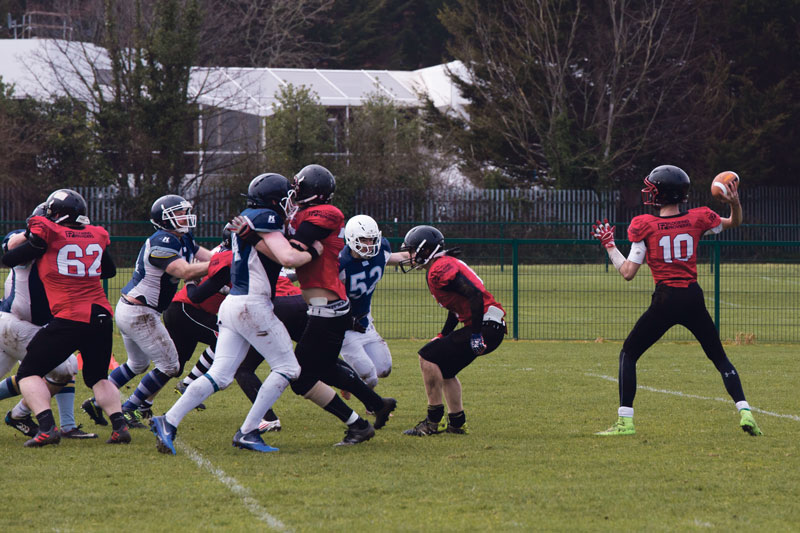As American icon and crooner Frank Sinatra proudly stated: “The record shows I took the blows, and did it my way.” This snippet from Ol’ Blue Eyes seems like a perfect description of how America’s game is played in Trinity. Perhaps “our way” would be more suitable, as despite the blows the players have faced on and off the field, there is unique sense of teamwork and understanding in the squad. Captain Len van Dalsen and player-coach Thomas O’Hara sat down with The University Times to preview their season, which began last week.
Despite the season not starting until mid-March, pre-season training began in September in order to prepare the freshman sign-ups, or “rookies”, for the toils of the game. Their first test came in the intervarsities tournament in November, and captain Len Van Dalsen told The University Times that this was used as a chance to blood new talent: “The thing with intervarsities is that we try to give rookies a lot of time. The reason why we start training so early is that a lot of guys will have never played before. So we have to get guys trained in and up to game speed by that time, so we give the rookies game time to make sure that they’re able to play when the season starts.”
The intervarsity tournament is a three-team tournament contested by Trinity, University College Dublin (UCD) and University of Limerick (UL) – the only three colleges in Ireland with American football teams. As reigning champions, UL were given a pass into the final game, leaving Trinity to face rivals UCD in a playoff game. Trinity’s rookies gave a decent account of themselves, but came undone in a 14-12 loss. “It was a bit of a messy game, the weather was poor and a lot of the players had never played before”, says Thomas O Hara.
If the momentum goes the way we hope it does, we should be able to start the season with three or four wins in a row
Nonetheless, the tournament acted as good preparation for the league season, which kicked off on March 11th, against UCD in Belfield. Trinity play in the Shamrock Bowl Conference of the Irish American Football League – the highest tier of American football in Ireland. In it they are joined by UL, UCD and club teams from the four corners of the country, pitting them against opponents of all shapes and sizes: “UL, UCD and ourselves would be mainly students with a sprinkling of ex-students – all the rest of the teams in the country would come from a very broad spectrum. I’d compare it to the way the AIL works in the rugby”, explains Van Dalsen.
Last year, Trinity qualified for the playoffs and missed a last-minute two-point conversion against the Belfast Trojans, falling to a 20-28 defeat and narrowly missing out on the semi-finals. When asked if they can go further this year, both say in unison: “Fingers crossed.”
Val Dalsen expands: “If the momentum goes the way we hope it does, we should be able to start the season with three or four wins in a row. If the momentum builds we could do anything.” O’Hara then quips: “Let’s hope it doesn’t all come down to that game that is scheduled two days after Trinity Ball.”
The summer season is one of the biggest obstacles facing Trinity, as Van Dalsen explains: “The biggest difference between the university teams and the club teams [is that] college teams would lose guys in the summer to J1s and whatnot while club teams would tend to retain their guys – during the summer it is harder with numbers.”
Despite getting a remarkable number of over 100 sign ups in Freshers’ Week each year, numbers still pose a problem, as O’Hara explains: “You’d be lucky to get a good 15 of them to stay on. If we get 10 per cent of our signups we’re happy. By the time this season starts we will have about 10 new guys, which is fine because over a four-year period that means you’re keeping around 30 or 40 guys so it’s not too bad. And you never know from those 10 guys, maybe three or four of them will bring a friend, so that gives you an extra few men too.”
From these 100 signups, a diamond in the rough was discovered in the form of second-year quarterback Ben Dowling – who Van Dalsen labels a “miraculous find”.
He realised that players run everything and he didn’t want to change much when he saw it was working
Perhaps what is most notable about American football in Trinity is the use of player coaches. Being one of them, O’Hara describes this as a “loose term”: “We do have a head coach – Garland Drake – this is his fourth year at the club. He realised that players run everything and he didn’t want to change much when he saw it was working. He puts in a bit here and bit there and he delegates to us, which is nice because it gives the player ownership of the team and makes us want to do well rather than just listening to a drill sergeant telling you to do everything.”
Drake hails from across the Atlantic and played at a high level in college. His knowledge of the game and his leadership on game day is indispensable for the team.
This student-led arrangement has been in place for the last six years at the club and proves that, with the right ethos, it can be just as effective as traditional structures. The team’s mix of experience and tactical nous, combined with youthful endeavor and inventiveness, could prove to be the perfect balance for Trinity. Win, lose or draw, at the very least they can say that they did it their way.







